Superheroes can be a tricky subject. They’re a staple of the comic book medium, of course, and for many readers (and non-comics-readers) superheroes are pretty much synonymous with comic books. With their sometimes absurd origin stories and colorful outfits, superheroes can inspire, well, not-so-inspiring descriptions: corny, infantile, escapist. When somebody calls something “comic book” as an insult, they mean that it’s two-dimensional and somewhat mindless—like many a comic book superhero.
But of course, that’s not always true. Although I won’t argue that all superhero comics have much literary merit, here’s a brief list of at least a few that show that the genre can rise above your expectations.
Batman: The Dark Knight — Frank Miller
I suppose it’s only fitting we begin with Batman. He’s always been a bit darker than the other classic superheroes (the 1960s TV show aside)—and a lot of that has to do with his origin story. But in Frank Miller’s hands, he took on some new dimensions that helped pave the way for darker, more mature themes in comics (and, yes, leading up to the current Dark Knight movie franchise).
Like Watchmen, Batman: The Dark Knight is a child of the ’80s—there are Cold War fears and media oversaturation. Throughout the book there are panels of talking heads, arguing and blathering about Batman and his influence on society. The plot involves Bruce Wayne’s return to crimefighting as Batman after a ten-year retirement. He’s old, and all the superheroes have been forced underground—but as things have gotten worse Batman can’t stay hidden. The book feels more like a building storm than a storyline that’s taking you somewhere: the tension builds and builds and finally explodes into chaos—but, of course, Batman has a plan. He always does.
While not everyone likes Miller’s take on Batman, it is clearly an influential book which made Batman even darker than before. It really teases out Batman’s unwillingness to compromise, contrasted with our own insecurities and tendency to hope everything will just blow over if we ignore it. The outlawing of superheroes is echoed in The Incredibles, even down to Commissioner Gordon’s complaints that people couldn’t handle giants walking on the earth because it made us feel small.
The 2001 sequel, The Dark Knight Strikes Again, pulls in a lot more of the old DC Comics superheroes and feels like a little more spectacle, a little less substance, but it still builds on similar themes. While both books are laced with a cynical humor (particularly when it comes to the media), things push beyond satire and into the realm of absurdity in the second book, with little person-on-the-street panels spouting inanities left and right. At any rate, the Dark Knight series is certainly not intended for kids, but essential reading for adult Batman fans.
For further reading, check out Paul Pope’s Batman Year 100, which is set in 2039 in a dystopian police state. There’s not ever really any explanation for how Batman is still alive at this point, but it’s a bizarre and fascinating tale about what happens when an urban legend turns out to be true.
Kingdom Come — Mark Waid and Alex Ross
What if the world were overrun by superhumans? What if Superman, Batman, Wonder Woman—all the classic superheroes of yesterday—were replaced by a new breed of powerful but unruly beings; what if, in the absence of new supervillains, these superhumans fought each other, just out of sheer boredom? That’s the world in which Kingdom Come takes place, at a time when the “metahuman” crisis is coming to a head. Superman is reluctantly brought out from his self-imposed exile, and takes the reins of the new Justice League.
It’s an interesting take on the world of superheroes, showing how super powers do not automatically make the world a better place to live. The story is told through the eyes of Norman McKay, an old pastor who’s been having visions of the end-times, and it’s an interesting take on the visions from Revelation. Waid does an excellent job of pulling all these old superheroes into one story and making them seem, well, reasonable. Even some of the really cheesy old characters (like Mr. Miracle, for instance, or Captain Marvel) feel like real people and not just flat cutouts.
This is also in large part due to Ross’ amazing artwork. One of the things that often disappoints me with comics is when I see the amazing art on the cover, and then open it up only to find something much different (and often of a lower quality). Now, I understand the reasons you’d have a splashy cover, but it usually makes the interior art pale in comparison. With Kingdom Come, Alex Ross painted not only the covers but also all of the actual comic book, and it gives a solidity to the whole enterprise that’s hard to find elsewhere.
Between Waid’s storyline and Ross’ art, Kingdom Come impresses on both levels. (Sadly, I can’t say the same for some of the follow-ups to this storyline, which I didn’t enjoy as much.)
Astro City — Kurt Busiek and Brent Anderson
Astro City is a long-running series, set in a Metropolis-inspired city filled with superheroes and supervillains. (After a three-year break, it returned this June.) One of the things that really sets Astro City apart from your Marvel or DC universes is that quite often the stories focus on the regular folks who live and work in the city. How would a bunch of superheroes in your world affect your life?
In Neil Gaiman’s introduction to the collection Confessions, he sums up what I liked about Astro City better than I could. The secret to good fiction is: “There is room for things to mean more than they literally mean.” Astro City is a superhero comic that is about more than superheroes. Granted, Superman is about more than just a guy who is bulletproof and can leap over tall buildings—but sometimes it’s easy to forget that.
Busiek puts the focus on the emotional effects (rather than the logistical effects) of a world of super-powered beings, and it really works. Better than just talking about the legal ramifications of superheroes (which I do find fascinating at times) or the billions in damage The Avengers did to New York City, Astro City lets you feel what it would be like to be surrounded by such events on a daily basis.
Concrete – Paul Chadwick
While he’s not exactly a crime-fighter, Concrete does have some amazing abilities (and has a crazy origin story). The story is that Ron Lithgow, former speechwriter, has his mind transplanted into the body of an alien. Now he’s a huge rock-like creature who is nearly impervious, has incredible eyesight and enormous strength. Thanks to the government he’s been given a cover story so he doesn’t have to be hidden, but very few people know his true origin.
The stories in Concrete often deal with the mundane matters of everyday life, but with the difficulties imposed by living in a clumsy, unfeeling body. The illustrations by Paul Chadwick are seriously some of the best pen-and-ink work I’ve seen in comics, and I think Concrete’s superior eyesight was simply an excuse for Chadwick to do some incredibly detailed linework. There is some mature subject matter so exercise your judgment before passing it off to your kids, but here’s a comic book that isn’t afraid to address (ahem) weightier matters.
Powers — Brian Michael Bendis and Michael Avon Oeming
Powers (somewhat like Astro City) is set in a place where there are superpowered beings but they’re not always central to the stories. Christian Walker and Deena Pilgrim are two homicide cops who specialize in crimes involving superhumans. Bendis and Oeming have taken an interesting angle on the superhero genre, turning it into more of a police procedural and whodunnit than a typical heroes-and-villains story. Powers has also won a few Eisner Awards, and if you like the crime writing you might also check out some of Bendis’ other works like Sam & Twitch or Jinx, but be warned that these can get pretty gruesome.
I’ve read a few of the Powers books and while I like the style of artwork, some of it seems just a little sloppy (like re-using frames) and there are a lot of cliches, plus I’ve noticed misspellings and punctuation errors. That said, I have enjoyed some of the story lines, and overall I appreciate the different perspective on superheroes offered here.
Top 10 — Alan Moore
Here’s one that our fearless leader Ken Denmead is particularly fond of: “Top 10 by Alan Moore is flat-out one of my Top 10 favorite books, period. This is storytelling. This is Hill Street Blues, as if everyone—cops and crooks alike—were superheros, but powers didn’t make things a whole lot better. The characters are deeply and emotionally written, the stories are sometimes devastating and sometimes uplifting, but mostly just relay a real life in an unreal setting. And, in typical Alan Moore fashion, the little details and Easter eggs are plentiful and whimsical. I love all the books in this family, and re-read them often.”
Hawkeye — Matt Fraction & David Aja
GeekDad regulars Corrina Lawson and Jim MacQuarrie both spoke up for the current run of Hawkeye. Corinna says: “Fraction and Aja’s Hawkeye is not only one of the best superhero series being published, it’s already made a case for being one of the best in the last ten years. The panel to panel choices, the atmosphere created by the artwork, and the willingness of the creators to let the visuals carry so much of the tale is something I’ve rarely seen in comics. It’s attracted some outside attention as well, being reviewed by a few non-comics sites. I highly recommend picking it up.”
And Jim (also our resident archery expert) adds: “Matt Fraction & David Aja’s Hawkeye is the best superhero comic currently on being published. The writing is sharp and wry with a natural humor rooted in the remarkably unique personalities that populate the story, and the artwork is gorgeous. The book tells the adventures of an Avenger when he’s not being an Avenger, which largely centers on Clint ‘Hawkeye’ Barton’s attempts to help out the neighbors in his building, avoid a variety of hired goons and femmes fatale, and juggle his relationships with the women in his life. It’s always entertaining and action-packed. Aja is a fantastic designer, and he produces pages that cross the border from illustration to fine art, always in service to the story. Even if it weren’t the best comic on the market, I’d still love it, because it’s also the best, most accurate portrayal of archery since the glory days of Mike Grell’s Green Arrow. More than the technical aspects of the equipment and form, Clint and Kate (his sidekick/protege) act like archers. Fraction and Aja get it, and it’s a joy to read.”
 It’s a Bird… — Steven Seagle and Teddy Kristiansen
It’s a Bird… — Steven Seagle and Teddy Kristiansen
Ok, we’ll close out with one that’s a little different. Technically, this probably falls under “memoirs” a little more than “superheroes” but it does involve Superman so I’m including it here.
I first heard about It’s a Bird… years ago on NPR’s Fresh Air, which had an interview with writer Steven Seagle. Seagle got an offer to write Superman comics, but he felt like he just didn’t “get” Superman and kept turning it down. His notes take the form of short comics stories, riffing on things like secret identities, Kryptonite, power, the color of his costume, and courage.
But the book is also about something else: Seagle’s struggle with Huntington’s Disease, which killed his grandmother and was the source of a lot of unresolved issues in his family. I love the illustrations by Kristiansen (which won an Eisner in 2005): they’re sketchy paintings, but each of the Superman stories is done in its own distinct style.
It’s a Bird… is an insightful and sensitive portrayal of Huntington’s Disease, but it’s also a fascinating rumination on the concept of Superman.
So, how about you, dear readers? Any superhero comics that you’d add to the list?
Click here to read the previous posts in this series:
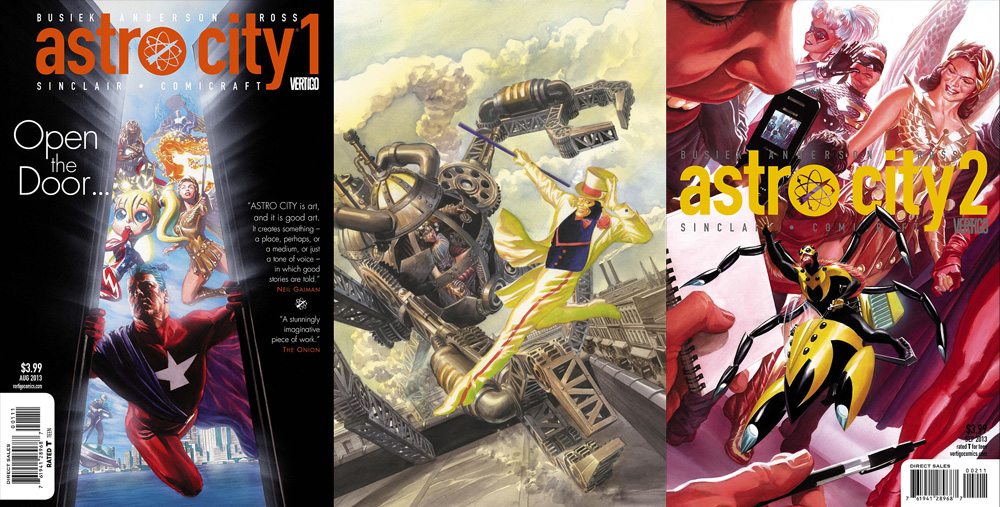
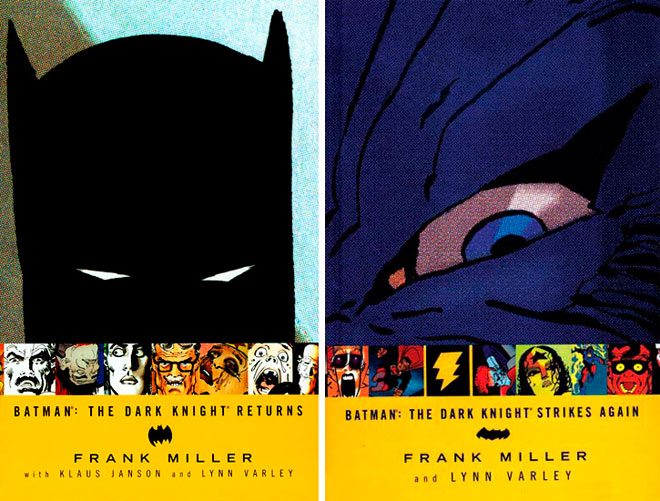


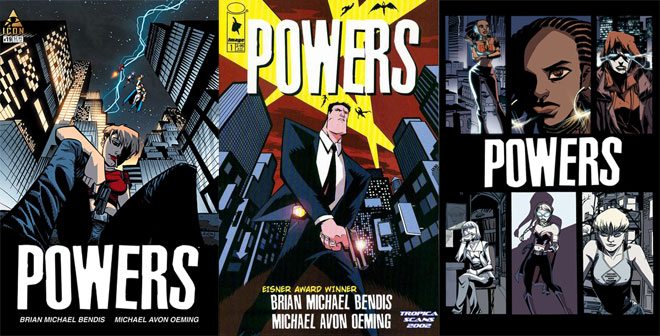
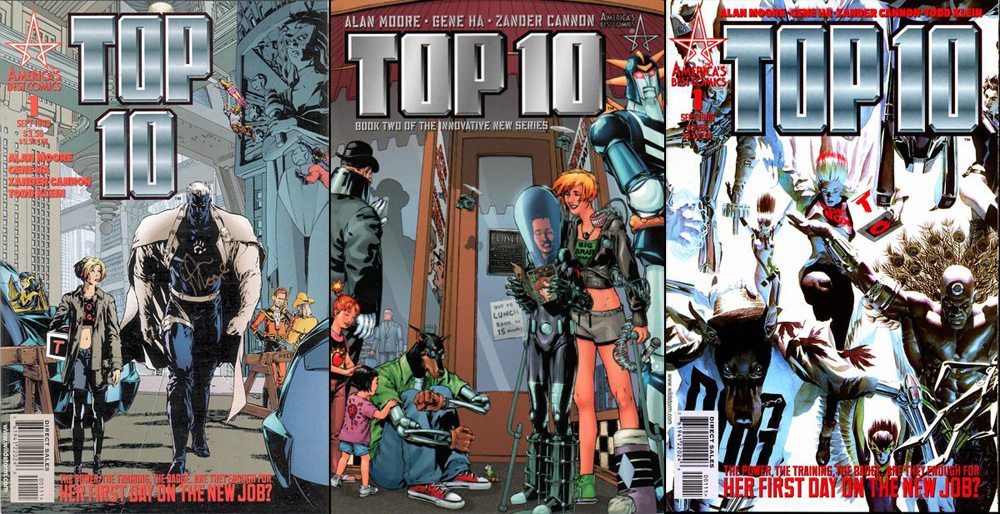
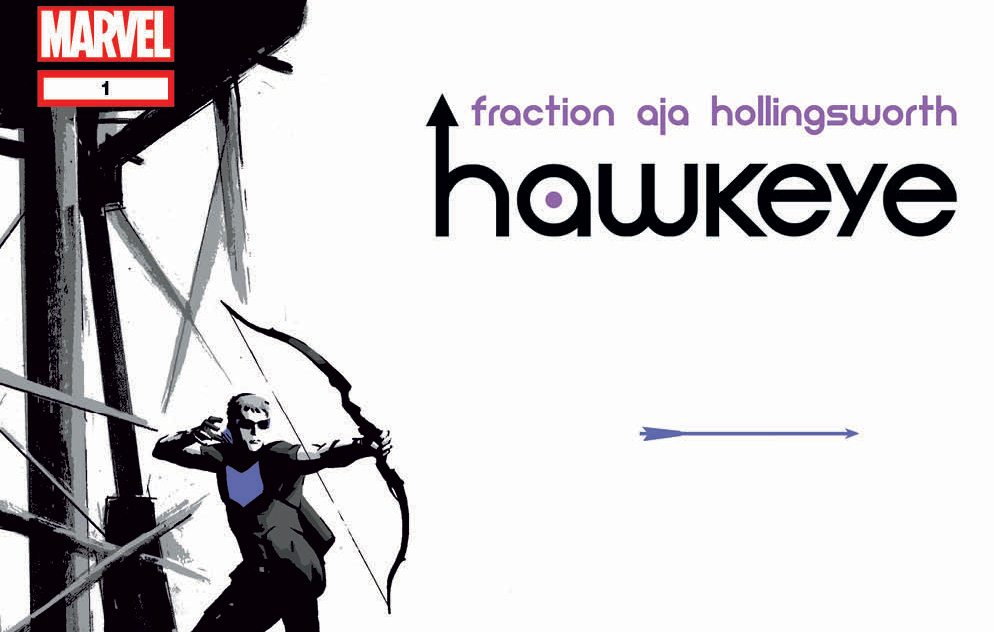


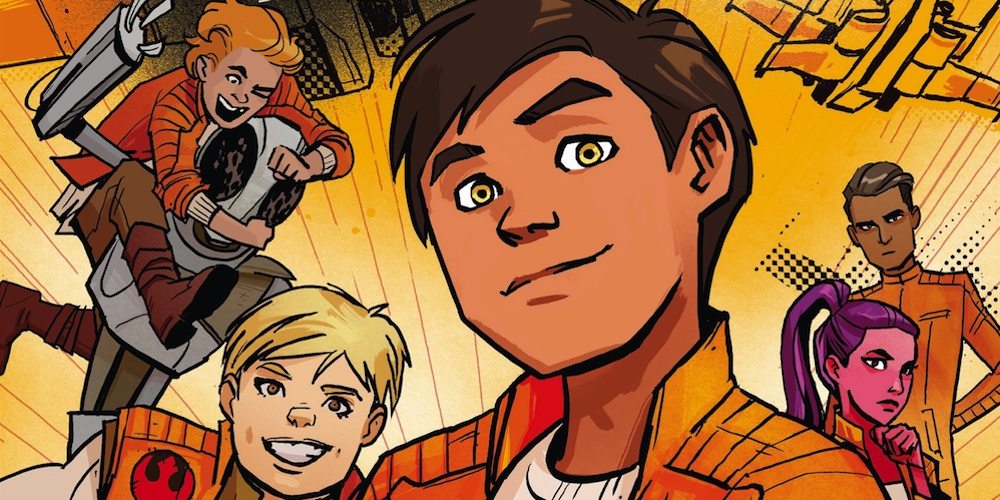

Excellent choices. I would also suggest Marvels by Kurt Busiek and Alex Ross, and Planetary by Warren Ellis.